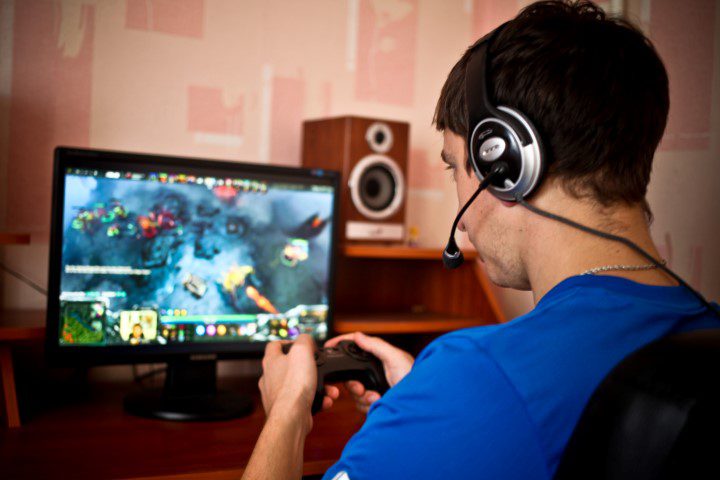Newsletter Articles, Posts for Parents, Raising Adolescents, Raising Boys, Screen time
Teen Boys & Gaming: The 10 Agreements for Healthy Balance

“How do I know if my son’s gaming habits are too much or harmful?”
Let’s start with a common-sense statement: gaming per se is a lot less harmful than risk-taking behaviours that many teens pursue like using alcohol, illegal or legal drugs, driving like hoons, porn-driven sexual behaviour, delinquency or smoking.
However the sensitive window of brain changes in early to mid adolescence up to 17 years of age means that teens are particularly susceptible to becoming addicted to anything in which they invest a lot of time and energy.
This is because the brain creates an abundance of dendrites to ensure that a teen can learn fast. It is a fabulous window of opportunity because they can learn a new language quicker, pick up a musical instrument quicker and, if focused and striving, they can improve in their competence and capability in sport, any academic pursuit, a new passion like skateboarding, singing, cooking or dancing.
However, an over use of technology for entertainment purposes may have some serious negative impacts on that same developing brain.
Remember technology that is used for educational reasons is seldom used for as long a period of time or as frequently as technology used for entertainment purposes. The issues occur with what happens when the brain is doing something repeatedly especially when it triggers our reward centre.
In days gone by teens created feel good brain chemicals by riding bikes with mates, playing sports, hanging out together, walking home from school and being outside a lot more.
Boys were more likely to be doing ‘risky’ things on those bikes, skateboards, surfboards, motorbikes or with drums or guitars. How things have changed!
As Victoria L. Dunckley M.D. writes in her excellent article for Psychology Today: Gray Matters: Too much Screen Time Damages the Brain research into video games has shown that during gaming, dopamine is released and this brain chemical is associated with reward and addiction. Because the addicted brain has been so overloaded with dopamine, it adjusts by reducing the number of dopamine receptors – so the reward is no longer as satisfying, causing users to crave more and more.
So from a common-sense perspective it is important to ensure there are healthy limits to the amount of time our teen lads are gaming to ensure that they do not experience what Dunckley calls electronic screen syndrome. Some lads waste hours watching YouTube videos ironically often about other teens playing online games.
Sadly it is not just the threat of developing an addiction to gaming that is the problem. As the article outlines, studies now show a shrinking of gray matter areas which is where we do our processing in people with internet/gaming addiction. This can affect all sorts of things including a persons ability to organise their thoughts and themselves, to plan, to prioritise. More worrying was the possibility that this phenomenon can impact our empathy and compassion.
Now as a former high school teacher and a counsellor who practised before the days of this tsunami of technology, I witnessed teens then struggling with these same concerns especially 14-15-year-old boys who often became disengaged at school.
I am deeply concerned about any further delays in the growth of the pre frontal cortex or the mature adult brain! I am very suspicious that gaming addictions may in many cases plays a role in many boys’ disengagement from school and university.
Friendship skills require real friends
Another area of concern for adolescents is emotional and social maturity. Those teen years 14-18 are an incredibly important time to develop friendships and a healthy sense of belonging.
While there is research that shows that playing video games can boost young people’s social wellbeing and have many positive impacts (playing games with your kids can be great for your relationship for example), the same researchers caution that ‘excessive or obsessive’ gaming will undo any such benefits.
Many teen boys have given up sport and outside recreational activities and are spending excessive hours in their bedrooms with no real human interaction.
This means they may miss opportunities to understand not only male communication especially the ‘teasing’ and light-hearted banter that happens in male company, but also the larger social exposure with other genders. I have increasing concern that many lads 19-24 are struggling with social anxiety and not leaving the safety of home. They lack intrapersonal and interpersonal confidence and many social norms.
Then when they come looking for a relationship they are pretty clueless around girls unless that have had a couple of sisters or girl cousins. Having friendships in real time is essential for healthy human development.
Research has shown that many teens feel more connected through technology however this does not necessarily translate into meaningful relationships in the real world.
We are wired to be a social being not a solo being and being able to know how to be a good friend cannot be found on Google!
Physically these lads are pretty easy to pick. They are often pasty or white faced as a consequence of a lack of sunshine and vitamin D. Many are unfit and either overweight or underweight. There has been little muscle growth and that in turn can compromise their health and wellbeing. Physical activity is an important part of adolescent development and as body image is now a huge concern among teen boys and young men, a gaming boy is at higher risk of struggling with this challenge.
So my suggestions to that mum (and all other parents) about when to worry comes down to this:
To have access to the wifi and his PC or device can your boy agree to the following terms:
10 agreements for teen boys
-

No computer or device in his bedroom – without permission.
- Be actively engaged in outside of bedroom/home activity that builds emotional and social competence at least twice a week – preferably group activity.
- Be playing some form of sport/martial arts/surfing at least 3 times a week.
- Complete normal chores around home.
- Ensure his school grades are maintained.
- Be at family meal times (without devices) and have an agreed bedtime (again, without devices).
- Have a friend/mate visit or he goes to visit weekly (and they have time offline)
- Be responsible for any excessive data expenses.
- Not disable the parental controls that are in place and ensure he maintains privacy controls on his accounts.
- Avoid porn sites and viewing MA 15+ or R 18+ or showing anyone else.
Please stress they are NEVER to show this material to anyone even if they ask.
If these things are all happening, your boy is managing his gaming in a way that is not going to cause long-term damage. It is called healthy boundaries.
You might also want to have other measures in place according to his age and your own family values… for example, ensuring he’s not using offensive language while gaming and perhaps getting him to check in with you before downloading new games so you can check their suitability. When boundaries start slipping I suggest they simply lose the privilege of access for 24 hours the first time, 48 hours the second time and an extra 24 hours each time. Our boys need our help to maintain this freedom to ensure they stay healthy on all levels.
Allow some flexibility if your son negotiates small changes occasionally this encourages cooperation and fairness rather than resentment and rebellion.
Please be mindful of the doomsayers who tell you that gaming will disastrous! One of my adult sons uses gaming to unwind after work and even though he is a highly addictive character, he manages to be healthy, work hard and be a loving husband and daddy.
It is excessive usage that can create serious problems and the 10 Agreements can help keep everyone happy!
For more on this, take a listen to the ABC’s Parental As Anything episode, Kids and Online Gaming. Maggie’s also dives deeper into adolescent boys and gaming (and much more) in her new book, From Boys to Men: Guiding our teen boys to grow into happy, healthy men published by Pan Macmillan Australia in August 2020.
You can grab the book at your favourite bookstore or at Big W, order a signed copy direct from maggiedent.com or order online from your favourite bookstore. Ebook and audio book versions are also available and the audio book version is narrated by Maggie herself (from the quite confines of her small wine cellar!)





